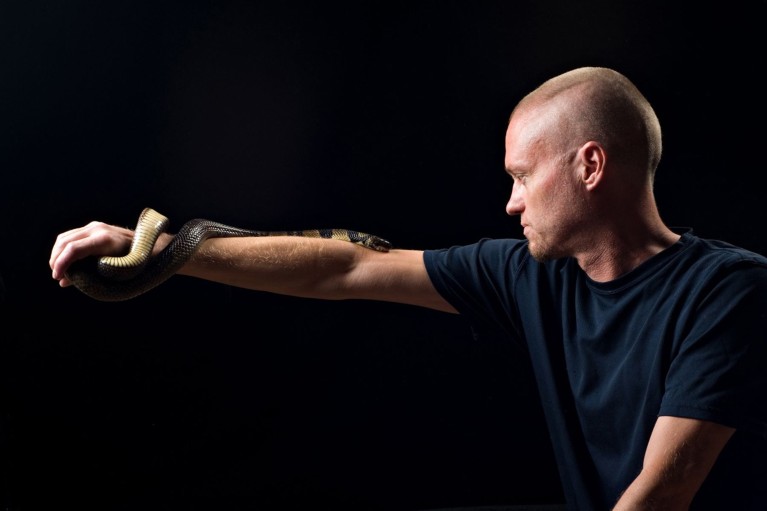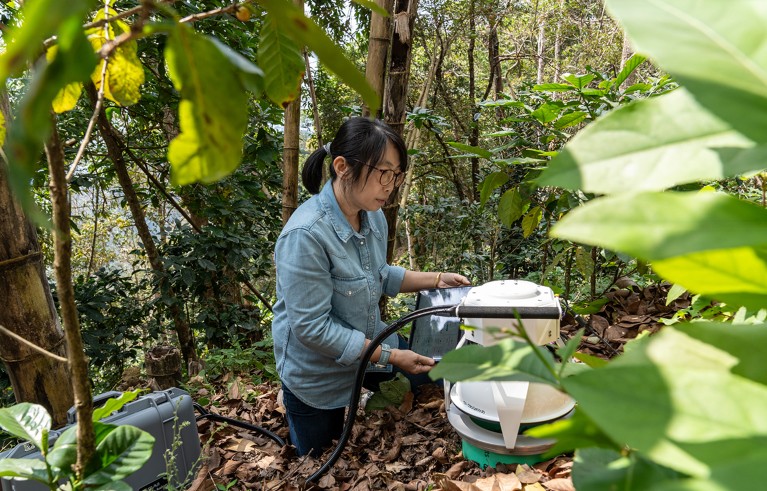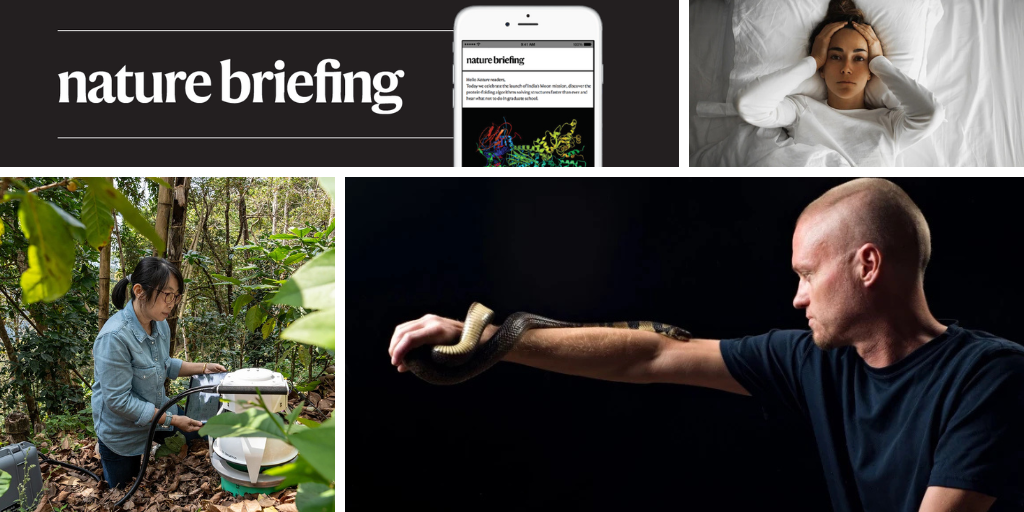You have full access to this article via your institution.
Hello Nature readers, would you like to get this Briefing in your inbox free every day? Sign up here.

Antibodies from snake collector Tim Friede, here with a water cobra (Hydrodynastes gigas), have been used to make a broad-spectrum antivenom.Credit: Centivax
The blood of a snake fancier who has been bitten by venomous snakes hundreds of times has been used to develop a potent antivenom. The therapy protects mice against the venoms of 19 species of dangerous snake, including the deadly king cobra (Ophiophagus hannah). The research could lead to direly needed treatments, scientists say. However, its reliance on material from a person who performed dangerous experiments on himself makes it ethically murky. “We did not advise Friede to do this and no one else needs to do this again,” says co-author Jacob Glanville, chief executive of biomedical firm Centivax.
From Thomas Edison to Benjamin Franklin, history is speckled with luminaries claimed to be able to thrive on as little as three hours of sleep. Now scientists have identified genetic mutations that probably contributes to some people’s limited sleep needs. One mutation, when genetically engineered into mice, caused the animals to sleep half an hour per day less than their unmodified brethren.
Fusarium foetens, a common fungus in our gut microbiome, produces a molecule that reduces the symptoms of non-alcoholic fatty liver disease in mice. This finding marks a step toward new treatments for the disease, which affects roughly 30% of adults worldwide.
Trump dismantles US science
US president Donald Trump’s proposed budget for fiscal year 2026 calls for unprecedented cuts to scientific agencies and targets work in areas including climate change, clean energy and the social, behavioural and economic sciences. The proposal suggests cutting roughly half the budgets of the US National Science Foundation, the US National Institutes of Health and the Environmental Protection Agency, which on Friday also announced plans to dismantle its primary research division. NASA would also lose about a quarter of its funding. Ultimately, Congress — which is controlled by a majority from Trump’s Republican party — will decide how the federal budget will be spent.
Staff members at the US National Science Foundation (NSF) were told on 30 April to “stop awarding all funding actions until further notice,” according to an email seen by Nature. The policy prevents one of the world’s biggest supporters of basic research from awarding new research grants and from supplying additional increments of money or subawards to existing grants. Researchers should be able to draw down money from grant funds that they have already received, NSF staff members say. “This country’s status as the global leader in science and innovation is seemingly hanging by a thread at this point,” one NSF staffer says.
The Trump administration has dismissed hundreds of scientists working on an influential report that outlines to federal and local governments how best to deal with the impacts of climate change. But they’re not giving up. “I volunteered for this effort, and I’m ready to continue it,” says systems engineer Costa Samaras, the lead author of a chapter of the National Climate Assessment. This echoes the commitment made last month by contributors to the National Nature Assessment, which was to have been the first nationwide look at US lands, water, wildlife and ecosystems. Given that the climate report is mandated by Congress, some worry that Trump’s team might produce a watered-down version that plays up climate-denial views.
Features & opinion
Support. Abuse. Connection. Manipulation. Researchers are probing the impact of increasingly sophisticated ‘AI companions’ and finding a mix of positive and negative experiences. Many observers are concerned about the possible risks and lack of regulation — particularly because they all think that AI companionship is likely to become more prevalent. “Everybody has these needs for connection,” notes human-communications researcher Jaime Banks. Whether these one-sided relationships are harmful comes down to the person as well as the machine, says cognitive psychologist Rose Guingrich: “What are these individuals’ alternatives and how accessible are those alternatives?”
Germany is not the only country to have a problem with bullying in academia, but a combination of structural and legal powers protect tenured professors over early-career researchers, enabling and emboldening abusers. “The strong hierarchy is a problem. And there is no official way for people who suffer from power abuse to know they will receive some help,” says intervention psychologist and dean Andrea Kübler. Almost all doctoral candidates at universities are on short-term contracts, which are dependent on supervising professors for renewal. “If you are a funding king, you can do almost anything,” says philosopher Amrei Bahr.
Where I work

Jiraporn Inthasan is an agronomist at Maejo University, Chiang Mai, Thailand.Credit: Gianmarco Di Costanzo for Nature
Agronomist Jiraporn Inthasan compares the carbon balance of different farming methods by taking direct readings of how carbon is trapped and released in the soil. “In this mountainous landscape, it takes two of us to carry the trace-gas analysis equipment out into the field to take these measurements,” she says. But it’s worth it to build an understanding of agriculture’s climate impacts beyond the emission of greenhouse gases. “We aim to capture the whole picture,” says Inthasan. (Nature | 3 min read)
On Friday, Leif Penguinson was rockpooling on Las Oquedades Beach in Islote Lobos National Park, Argentina. Did you find the penguin? When you’re ready, here’s the answer.
Thanks for reading,
Flora Graham, senior editor, Nature Briefing
With contributions by Jacob Smith
Want more? Sign up to our other free Nature Briefing newsletters:
• Nature Briefing: Careers — insights, advice and award-winning journalism to help you optimize your working life
• Nature Briefing: Microbiology — the most abundant living entities on our planet — microorganisms — and the role they play in health, the environment and food systems
• Nature Briefing: Anthropocene — climate change, biodiversity, sustainability and geoengineering
• Nature Briefing: AI & Robotics — 100% written by humans, of course
• Nature Briefing: Cancer — a weekly newsletter written with cancer researchers in mind
• Nature Briefing: Translational Research — covers biotechnology, drug discovery and pharma


